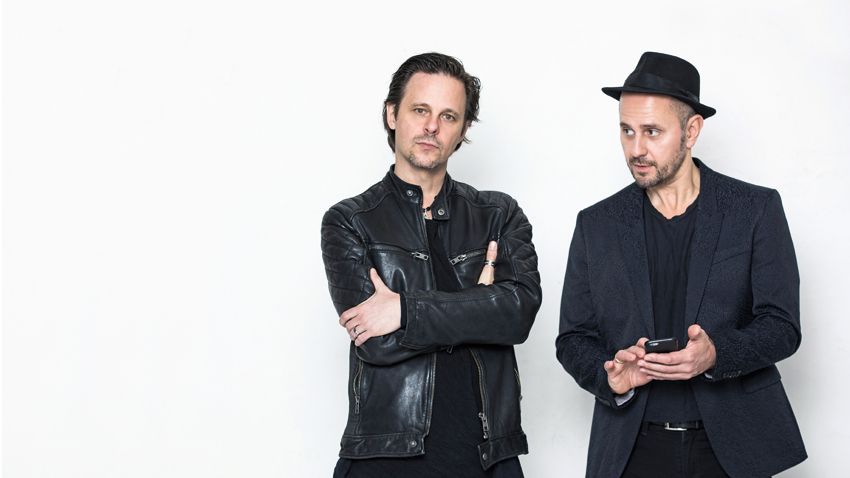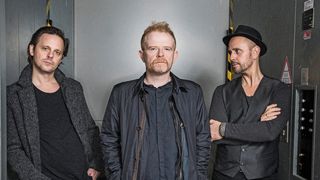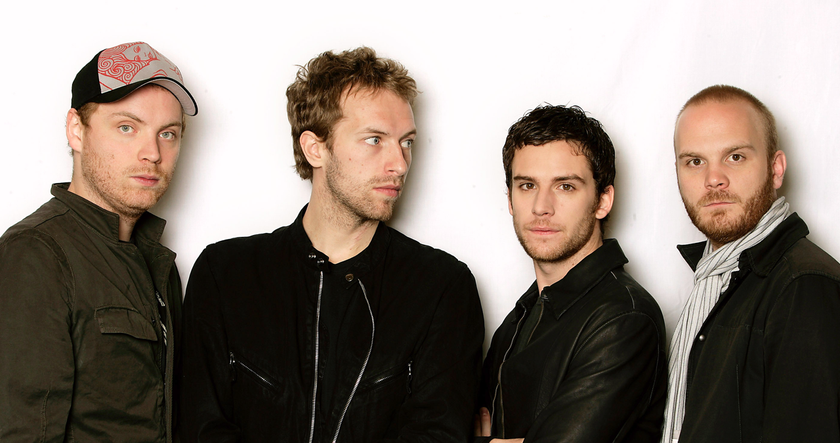Booka Shade talk tech, record deals and making music for girls
The German tech house duo loaded up 400 plugins for their new album, Galvany Street, but found inspiration in the analogue world

“A few years ago, a guy came up to me in a club and started telling me what he thought about our music,” explains Arno Kammermeier, one half of acclaimed and German tech house duo Booka Shade. “He was struggling for words, but at the end, he said, ‘Your music is for girls’.
“Haha! I think he was criticising us, but at the time I had to smile because I took it as a compliment. Yeah, our music is a bit more relaxed and melodic than a lot of the angry, industrial, in-your-face music.
“And if our new album [the just-released Galvany Street; a sort of Cubist, 80s-tinged electro funk party] puts us on the outside, I don’t mind at all. It’s much more fun on the outside!”
Arno and fellow Booka, Walter Merziger, have been making music together since they met in the school band at 14. Originally producers for hire during the Eurodance ’90s, they eventually set up their own label, Get Physical, and captured everybody’s attention with the 2004 album Memento.
They followed that with the single Body Language, a huge Ibiza hit that has since been sampled by will.i.am and recently provided the instantly recognisable bassline for Jax Jones’ biggie You Don’t Know Me.
As well as their five albums and a DJ Kicks compilation, Booka Shade have remixed everyone from The Knife and Gorgon City to Nero and Depeche Mode. Kammermeier readily admits that the collaboration with Depeche Mode still puts a huge smile on his face.
Were they a big influence on the early Booka Shade sound?
Get the MusicRadar Newsletter
Want all the hottest music and gear news, reviews, deals, features and more, direct to your inbox? Sign up here.
Arno Kammermeier: “I think it’s fair to say that they probably influenced most electronic bands in Germany. That might sound like a big statement, but right from the early ’80s, Depeche Mode were massive in Germany; even bigger than they were in the UK.
“Of course, there were other bands, too. New Order, Joy Division, Soft Cell. They all took pop music and made it a little darker.
“Being German, I also have to mention Kraftwerk - as a kid, I wasn’t quite sure what to make of these strange guys in their suits. They scared me a little bit.”
Even today, they still scare people!
AK: “Ha ha! I know what you mean, but we’ve been lucky enough to meet the guys a few times and Fritz Hilpert [current Kraftwerk-er] helped us mix a track on the new album, All Falls Down. They’re great people, and they’re still pushing electronic sound into new places.
“The first Summer of Love was also very important for us, introducing us to what was happening in Manchester and the UK rave scene… acid house. And I guess that all came together in Frankfurt, which became a kind of alternative centre for the electronic sound of Germany. There were a couple of record companies there, too, so that’s where we originally based ourselves.
“We’re now based in Berlin. Things were happening in Berlin in those early days, but Frankfurt felt like a happier scene. It was all about trance, ecstasy, harmony and, like that guy said, it was girls’ music. It wasn’t just a room full of guys shaking their fists and being angry at the world.
“Looking back, we can all now see that the explosion in electronic music was being driven by the explosion in musical technology. We were young guys and very curious about computers, samplers, synthesisers. There’s a story we’ve told before about Walter’s mum driving us 50km to a music shop because someone told us that they had a PPG Wave in the window. We drove all that way just so we could look at this machine. We were crazy about music!”
Walter Merziger: “My mother was also the first person that saw me connect a sequencer, a drum machine and a synthesiser via MIDI. I was in my room and suddenly it happened. I hit a button and the synth started playing. I was so excited that I shouted down to my parents. ‘Come and see this, it’s like magic! I’m playing the synthesiser with no hands!”

Were you both really in the school band?
AK: “Well, it was a school group… a kind of prog rock group. We used to play things like Manfred Mann’s Earth Band and Van Halen’s Jump. My friend had a Poly-800, and I can definitely tell you that the Jump brass sound came from there.
“Then we moved onto the new wave stuff, and pop, too. Walter and I did get a deal with EMI before Booka Shade; that was with a more poppy band. But as we started to delve further and further into electronics, we began to see what was possible. With your own studio - your own setup - the big record companies were no longer in charge of your music. You didn’t need their big fancy studio; you could put the music together in your bedroom and release it yourself. Little independent labels were appearing everywhere, and I think it’s good to remember just how important that was in the early electronic days.
“If the big labels had maintained their control over the industry, I don’t think you would have had so much experimental music - so much breaking down of barriers. A little band could take control of their own career.
“The release of our single Body Language is a good example of that. It didn’t really fit in with any of the trends that were happening at the time. It was very simple, lots of space; but, at 130bpm, it was also too fast for house. I don’t think there was anything else that sounded like Body Language. A major label might have been worried about releasing something that didn’t fit into the usual categories, but we released it on our own label, so the only people that really mattered were us. If we believed in the music, we felt that other people would believe in it, too.
“The funny thing is that, even though the big labels lost control and also missed out on the digital and internet explosion, they seem to have climbed their way back to the top. They control all the big Spotify lists and they control a lot of the radio play. But the big difference in 2017 is social. An artist can have a direct connection with people via the phone; they can earn a little bit of money from streaming - you can make a career.”
Presumably, you’ve made a few quid from will.i.am and Jax Jones…
WM: “Yes, but I don’t think we’ve ever been one of those bands that gets too precious about sampling. There is lot of music out there and we’re all influenced by it. Sure, if it’s a straight 100% copy from a record - like the Body Language bassline - you need to come to some sort of agreement, but there have been other cases where you have to say music is music.
“The will.i.am story was quite funny, though. We were told that, when he sampled the Body Language bassline for Get Your Money, he went to his record company and said, ‘This bassline is from an underground Ibiza track - no one will notice it’. The record company guy had to tell him that Body Language had been a huge hit and that everybody would notice it.
We were told that will.i.am went to his record company and said, ‘This bassline is from an underground Ibiza track - no one will notice it’. The record company guy had to tell him that Body Language had been a huge hit and that everybody would notice it.
“Artists might think they can sample from an underground hit without too many problems, but you have to realise that even an underground hit might have five or ten million plays on YouTube and Spotify.
“That reminds me… there was a Madonna song that came out a while back, and people were calling me up and saying, ‘Have you heard that? It’s totally your song, Mandarine Girl’. I think it was Get Together. Yeah, I listened and the vibe feels quite similar, but is that something you go to court for? It doesn’t steal the main riff or anything like that.
“I’ve been told that [Madonna producer] Jacques Lu Cont was a big fan of our Movements album, but that’s nothing but an honour for me. There are more important things in life that sitting around saying, ‘This is influenced by this and this’. We’re in 2017 and there are thousands and thousands of songs released every week. Every note has been used and every musical story has been told. Today, I think it’s more important to think about getting your personality into your music rather than worrying if your chords have been influenced by another artist. Your personality helps you find your sound.”
There’s not really a clear delineation of skills in Booka Shade, but is it fair to say that Walter is the one who spends the most time in the studio?
WM: “I’m the one who can get lost in technology if I’m not too careful! When we were purely producers and writing hits to order, we were lucky enough to make good money, and we had some pretty wild studios. At one point, we even bought George Michael’s entire studio from him because he wanted to change it.
“But by the time we began to concentrate on just making music for ourselves - maybe 15 years ago - we started to bring down the size of our working environment. Plugins and VSTs were improving so rapidly, and we also realised that playing live was going to become an issue for us. If we were a ‘band’, we’d have to travel, and that meant the studio had to be compact. We still have a main studio, but almost everything we need is contained in a MacBook Pro with an SSD drive.”
You were early adopters of Pro Tools. Is that still the main studio DAW?
WM: “We used Pro Tools in the early days because, as producers for hire, we were recording a lot of vocals, and Pro Tools was the first program that really allowed you to work with audio. Before that, we’d been working with a Studer 24-track machine, and I can remember paying around 300 marks for one reel of tape. 20 mins for 300 marks! And by the time you’d finished a big session, all the top end had disappeared.
“But there were still problems in those Digidesign days, too… trying to get Pro Tools to talk to your VSTs - that wasn’t easy! Losing sounds every time there was an upgrade because this licence no longer worked with that licence. Then you had to buy a new computer because the operating system changed… and new operating systems caused even more problems!
“Can you believe I still have every computer we’ve ever used? Maybe more than ten, all gathering dust. But I’m so glad I kept them, because when we released Movements 10 [the 10th anniversary re-working of the 2006 album Movements], I had such a hard time trying to pull together all the ingredients, and I needed the help of all that old equipment. It was only a ten-year gap, but technology had changed so much.
“Sorry, what were we talking about? Oh, yeah… Pro Tools. Even before Pro Tools, we always used Creator and Notator as our sequencer, so when Logic appeared, we liked it straight away. It felt very familiar. And that’s the main platform for us today. Logic with about 400 plugins!”

That’s an impressive number of plugins!
WM: “Our problem is that we always like to try something new. If I make a song with these five plugins, I’ll make my next song with five different plugins. As soon as a song is finished, I move on. I want to find something new.
“The weird thing is that the initial inspiration for the new album didn’t come
from any one of our plugins – it came from our old Roland JP-8000, one of my favourite synths. Somewhere in a dark corner, it was hiding, so I switched it on, and the first sound I heard is the first sound you hear on the album, on the track Digging a Hole. The sound was so full of character and seemed to fit perfectly with [vocalist] Craig Walker’s voice. That combination somehow gave the album direction.
“And the other important ingredient was an old Yamaha preset machine that I found on eBay for 50 Euros. It’s called a YS200, and it has the most amazing brass sound. I instantly liked it because it didn’t sound like any other brass sound I’d ever heard.
“Sometimes, it can be the tiny things that give you the biggest inspiration.”
Which of the 400 contributed to the new album?
WM: “There are some obvious ones. Native Instruments Komplete, all the Arturia classics, the Waves CLA compressor is on every track, the Audio Damage Eos reverb… that’s been on every track for about the last five years.
“But I was also investigating a lot of freeware. Just small synths that might have one or two really interesting sounds. I guess I was looking for simple sounds; getting away from that pumped-up EDM atmosphere with effects and reverbs on every preset. We like to keep some space in our productions, and those ‘big’ sounds just take up too much of that space.”
We had chart hits, we wrote music for adverts… we even created some music for a Levi’s ad that ran in the Super Bowl. Every production was getting bigger and bigger, and it kind of made us a little crazy. You can’t do that kind of thing forever because it’s so exhausting.
Even though it’s past its peak, there’s still a lot of money in EDM. Weren’t you tempted to bash out a couple of festival anthems for the summer crowd?
WM: “Are you kidding? Man, we had 15 years of pop anthems! We had chart hits, we wrote music for adverts… we even created some music for a Levi’s ad that ran in the Super Bowl. Every production was getting bigger and bigger, and it kind of made us a little crazy. You can’t do that kind of thing forever because it’s so exhausting. We had some good years, but now I’m happy just making our own music.
“Hmm… having said that…”
Yeah..?
WM: “Do you get the feeling that pop is just beginning to get interesting again? I love what The Weeknd is doing - stripped back and clean. Quality, adult electronic music. It almost feels like pop music has grown up a little bit, but the productions have become more relaxed. Ha ha! Maybe it is time to write a pop single!”
Galvany Street, featuring Craig Walker, is out now on Blaufield Music.


Computer Music magazine is the world’s best selling publication dedicated solely to making great music with your Mac or PC computer. Each issue it brings its lucky readers the best in cutting-edge tutorials, need-to-know, expert software reviews and even all the tools you actually need to make great music today, courtesy of our legendary CM Plugin Suite.

“If it wasn’t for that song, that would have been the end of the band”: How one track’s sudden gear-switch led Coldplay into their imperial phase

“He was like, ‘You’ve got it all wrong, man": Mumford & Sons reveal what Neil Young told them about the way they were approaching their live shows and album recordings









